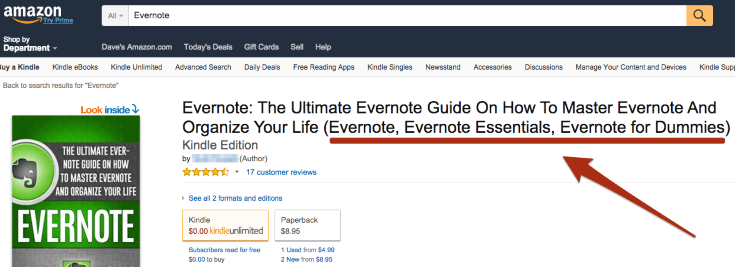By Dave Chesson (@DaveChesson)
Ranking books on Amazon is a bit of a mystery to some of us. Today, Dave Chesson explains how to get your book to rank higher. I think you’ll find this interesting and helpful.
One thing many self-publishers don’t realize is that Amazon, like Google, uses a search engine to find, and list its books. All you have to do is type in the search box a phrase or sentence, and Amazon will provide you with a list of best options.
One thing that can be a powerful marketing tactic for authors is to ensure their book reaches the top of a search list. If you wrote a book on weight loss, I’m sure you can imagine how great that would be for your sales if your book were the first to show up.
However, what makes Amazon’s search engine chose one book over the others?
Why is it that certain books show up for specific terms but not for others?
It turns out it’s all about the words you use and the method of execution in your sales.
In the following article, I’m not only going to show you how you can optimize your book’s sale page for better rankings but also, some easy steps to help give your book’s sales page a boost.
What Are You Aiming For
Before we get into the five simple changes you can make so as to get your book to the top of a search result on Amazon, you need to know which keywords you want to aim for. Without this, there is no point in optimizing your Amazon sales page. That would be like shooting in the dark.
Therefore, you need to take the appropriate steps to conduct some basic Kindle keyword research and find those words that people are searching for, but aren’t too competitive. There’s no point targeting a keyword phrase that no one cares about or has too much competition. In both cases, your book will never see the light of day.
Now that you have a target keyword for your book let’s go ahead and look at five simple ways to let Amazon’s search engine know that your book deserves to be higher for that search phrase.
-
Kindle Keywords: Not What You Think
One of the quickest and best-known ways to let Amazon know you should be considered for a keyword phrase is in the Kindle Keyword selection. These are the seven keyword phrases that Amazon asks for when you go to publish your book.

Once you’ve told Amazon your seven keywords, they will take your list into consideration and rank you somewhere in the results list for those keywords. It could be on the first page or the 27th page – that all depends on the competitiveness of that particular keyword.
However, these Kindle Keywords don’t just help you rank better. They can also be important in unlocking special Kindle categories. So, make sure you choose wisely when selecting your seven.
-
Title: What’s In a Name
Although there are some super important factors that you should consider when choosing the title for your book, the ability to add targeted keywords in the title can play a large role in where your book ranks.
The title is the best indication of what your book is about. Therefore, if someone types a keyword phrase into the search box and your title has that exact phrase in it, then there is a good chance they are looking for your book or a book just like it.
Now, I’m not saying you need to change your title so as to make a keyword fit. I only highlight that keywords should be a part of your decision matrix as you work to craft that perfect book title.
-
Subtitle: the Second Best Thing
If you can’t fit a keyword into your title, then don’t fret. There is always the subtitle.
Here, you can place important keywords, phrases and benefits to help entice the reader to select your book. Just like with a title, you are telling Amazon that your book is about a certain subject.However, word to the wise, don’t go overboard here. We’ve all seen the book subtitles that are keyword stuffed, sometimes just listing them inside of parentheses like below:

This can be seen as tasteless and obvious to the reader, so I would recommend not following this sort of method of just stuffing keywords into your subtitle.
-
Description: Optimized and Ready
The good news about a Kindle book description is that you have 4000 characters in which you can type. This is a prime opportunity to discuss some of your targeted keywords in a natural way without being obnoxious.
This can also be beneficial to fiction authors too. In the fiction book Terms of Enlistment, Marko Kloos added at the bottom of his description the following:
The debut novel from Marko Kloos, Terms of Enlistment is a new addition to the great military sci-fi tradition of Robert Heinlein, Joe Haldeman, and John Scalzi.
It just so happens that now, his book shows up for anyone searching for books like Starship Troopers, Forever War, and Old Mans War which are all books that the above writers have written.
That’s some great company to be with and has definitely increased the amount of times his book has shown up in the Amazon searches over this past year. It’s also how I found him and read his series since I love all three of those books.
-
Keyword to Sales Conversion: The Holy Grail
Let’s face it, Amazon is all about presenting the right product for the customer – which is good. So, what makes a product the “right” product? Simply, it’s the product that makes the most sales.
Amazon wants to maximize their sales. Therefore, if someone types in a keyword, finds your book, and buys it, then that customer has just sent the strongest signal to Amazon that your book belongs in that Kindle keyword ranking. If it happens enough, you’ll surely be placed #1.
One way to influence this is that if you have someone who wants to buy your book, instead of just sending them the link, you can tell them what keyword phrase to type into the search box and have them find it through that. That way, when they go to buy it, they will send a strong signal to Amazon.
Conclusion
Keywords aren’t a ‘magic bullet’ and are usually not the difference makers between success and failure in ebook marketing. However, as you can see, the optimization of your Amazon sales page to a specific keyword can absolutely help. Simple changes to a stagnant book, can breathe new life. It only takes a little bit of time.
Given the right set of keywords, you can get your book in front of more potential customers and hopefully get more sales. Worse case scenario is that you did some research, made some changes and nothing happened.
So, have you checked out any potential keyword opportunities and optimized your Amazon sales page?
 Dave Chesson is the author behind Kindlepreneur.com, a website devoted to teaching advanced self-publishing marketing methods. If you would like to know more about Kindle keywords, or Amazon search engine rankings, then check out his free book on Amazon Kindle Rankings on his website.
Dave Chesson is the author behind Kindlepreneur.com, a website devoted to teaching advanced self-publishing marketing methods. If you would like to know more about Kindle keywords, or Amazon search engine rankings, then check out his free book on Amazon Kindle Rankings on his website.
Photo: pixabay.com.





